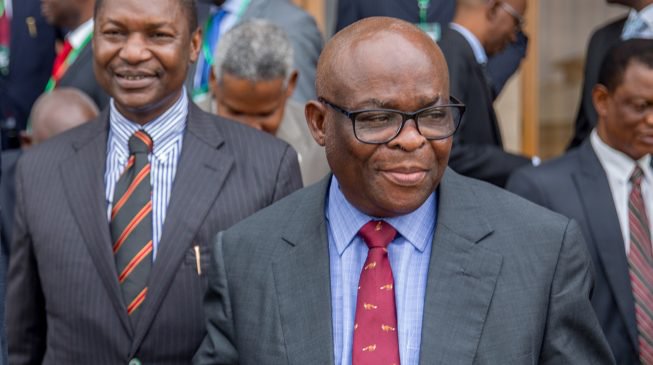Godwin Tsa, Abuja
The government of Cross River State has approached the Supreme Court to set aside the six-count charge of false assets declaration against the suspended Chief Justice of Nigeria (CJN), Justice Walter Onnoghen.
The suit filed by the Attorney-General of Cross River State on behalf of the state government is challenging the suspension and trial of Justice Onnoghen at the Code of Conduct Tribunal (CCT).
The suit, dated January 22, 2019, and marked SC/45/2019, has the Federal Republic of Nigeria (FRN) and the Attorney-General of the Federation (AGF) as defendants.
But, the Federal Government has asked the apex court to dismiss the suit as the plaintiff has no locus standi to institute it.
In a notice of preliminary objections filed by the AGF and Minister of Justice, Abubakar Malami (SAN), the Federal Government further challenged the jurisdiction of the court to entertain the matter on the ground that “there is no dispute between the defendants in this suit and the plaintiff as envisaged under Section 232(1) of the 1999 Constitution (as amended)
It is also the contention of the Federal Government that “the subject matter of this suit is personal to Justice Onnoghen and does not in any way affect the Cross River State government as to confer it with the locus to institute this suit.
“The reliefs and claims made herein by the plaintiff are not for the benefit of Cross River State but personal to Hon. Justice Onnoghen Nkanu Walter Samuel.”
Meanwhile, when the matter came up for hearing yesterday, counsel to the plaintiff, Locius Nwosu (SAN), informed the court that he was just being served with a copy of the preliminary objection in court by the defendants and needed a short adjournment to enable him respond to it.
Counsel to the defendants and the Solicitor-General of the Federation, Dayo Akpata, confirmed the position.
The seven-man constitutional panel of justices of the Supreme Court, led by Justice Bode Rhodes Vivour, accordingly adjourned the case to next week Thursday in view of the urgency of the case.
Other justices of the panel included Justice Olukayode Ariwoola; Justice Mary Peter Odili; Justice Kudirat Kekere-Ekun; Justice Ejembi Eko; Justice Musa Dattijo Mohammed and Justice Dauda Sidi Bage.
In the originating summons, the plaintiff posed four questions for determination by the Supreme Court as follows: “Whether upon proper interpretation of the provisions of section 4, 5 and 6 of the 1999 Constitution of the Federal Republic of Nigeria (as amended), the Constitution clearly recognises and guarantees the doctrine of separation of powers and checks and balances relating to the legislature, executive and judicial arms of government.
“If the answer to above is in the affirmative, whether upon a combined reading of the provisions of sections 153(1) and paragraph 21(b) of part 1 of the third schedule of the 1999 Constitution (as amended) the National Judicial Council (NJC) is the exclusive body vested with the power and authority to recommend to the president or governor, the appointment and removal of all judicial officers at the federal and state levels given that it solely exercises disciplinary control over judicial officers.
“If the answer to the above is in the affirmative, whether the Code of Conduct Tribunal, which forms part of the executive arm of government, and not being the National Judicial Council is vested with jurisdiction over a judicial officer for any alleged official misconduct of whatever kind.
“Whether upon the proper interpretation of the provisions of the 1999 Constitution, particularly sections 4, 5, 6, 153(1), 158(1), paragraph 21(b) of part 1 of the third schedule of the 1999 Constitution (as amended), the purported filing of the charge in charge No. CCT/ABJ/01/19 between FGN vs Hon. Justice Onnoghen Nkanu Walter Samuel before the Code of Conduct Tribunal against a judicial officer, who in this case is the Chief Justice of Nigeria, without any formal complaint having been made against him to the National Judicial Council robbed the tribunal of jurisdiction to try the charge, and all the proceedings relating thereto are null and void, a nullity.

